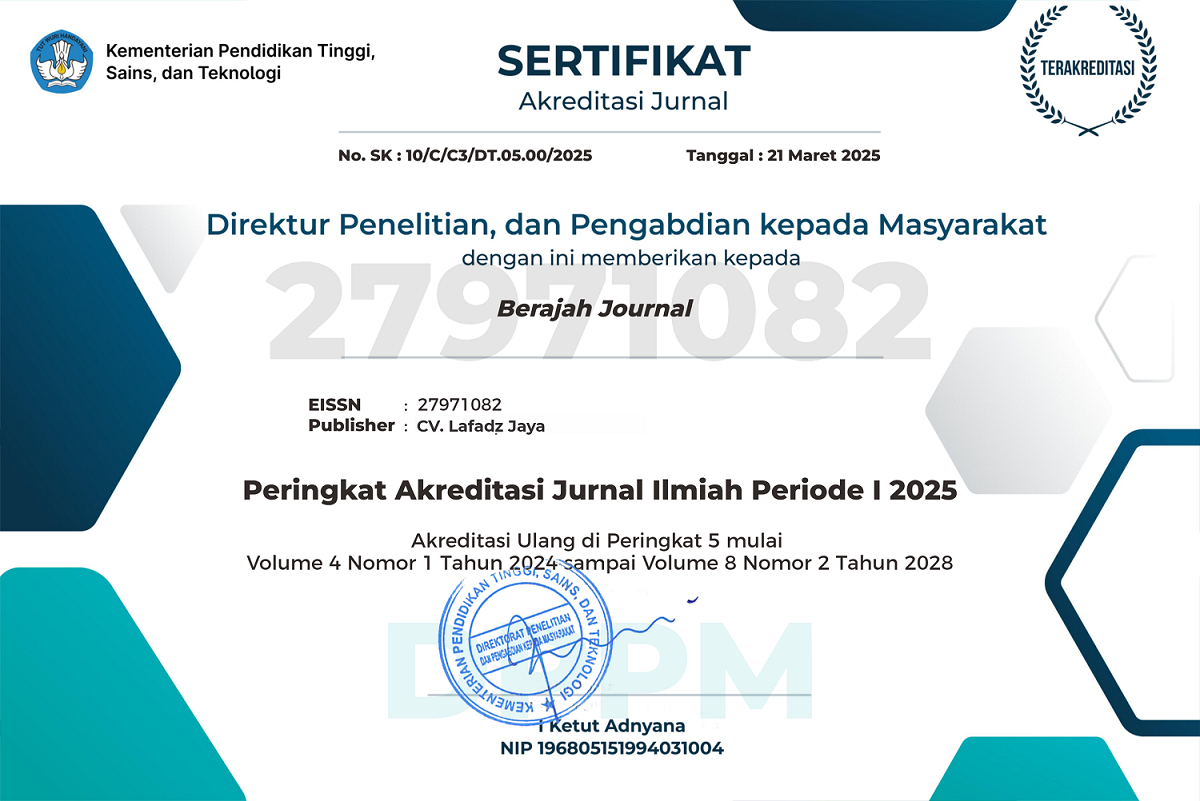ISLAMIC FAMILY LAW AND SOCIAL TRANSFORMATION: A STUDY ON MARRIAGE, DIVORCE, AND INHERITANCE IN THE SHARIA SYSTEM
DOI:
https://doi.org/10.47353/bj.v4i7.448Keywords:
Islamic family law, Sharia system, marriage, divorce, inheritanceAbstract
Islamic family law plays a central role in structuring marriage, divorce, and inheritance matters within Muslim societies, balancing ethical principles with legal mandates in a rapidly changing world. This study examines how Sharia law's family regulations adapt and transform to address evolving social norms while preserving Islamic principles. Using a qualitative approach, this research analyzes primary sources, including Qur’anic verses and Hadiths, alongside modern interpretations of Islamic jurisprudence (fiqh) and legal reforms in various Muslim-majority countries. Findings reveal that, while Sharia law traditionally emphasizes responsibilities and roles within the family unit, recent reforms reflect an increasing recognition of individual rights, especially in marriage and inheritance. These adaptations respond to social demands for equity, particularly regarding women's rights and gender roles, highlighting a nuanced interplay between religious values and societal needs. This paper offers insights into the role of Islamic family law in fostering family stability and continuity while responding to modern challenges and calls for balanced frameworks that respect both tradition and contemporary values.
Downloads
References
Al-Ghazali, I. H. (1993). The Revival of the Religious Sciences. Translated by M. Abul Quasem. Kuala Lumpur: Islamic Book Trust.
An-Na’im, A. A. (2002). Islamic Family Law in a Changing World: A Global Resource Book. London: Zed Books.
Barlas, A. (2002). "Believing Women" in Islam: Unreading Patriarchal Interpretations of the Qur’an. Austin: University of Texas Press.
Cammack, M., Young, L. A., & Heaton, T. B. (2007). Islamic Divorce in the Twenty-First Century: A Study of Indonesian Cases. Journal of Muslim Minority Affairs, 27(1), 61–75.
Choudhury, A. (2015). Islamic perspectives on the recognition and implementation of family law. Journal of Islamic Law and Culture, 17(3), 280–300.
Effendy, N. (2015). Psikologi Komunikasi dalam Keluarga Muslim. Bandung: PT Remaja Rosdakarya.
Esposito, J. L., & DeLong-Bas, N. J. (2001). Women in Muslim Family Law. Syracuse: Syracuse University Press.
Fadli, I., & Kusuma, P. (2019). Pengaruh peran keluarga dalam hukum Islam terhadap pendidikan karakter. Jurnal Psikologi Pendidikan dan Perkembangan, 8(2), 65-72.
Ghazali, A., & Nadhifah, I. (2021). Hukum Keluarga dalam Perspektif Islam: Perbandingan Klasik dan Modern. Jurnal Hukum Islam, 19(2), 118-130.
Hallaq, W. B. (2009). An Introduction to Islamic Law. Cambridge: Cambridge University Press.
Hidayati, F., & Pratiwi, A. (2020). Peran media dalam menyosialisasikan hukum keluarga Islam di Indonesia. Jurnal Psikologi Udayana, 11(2), 150-160.
Ibn Taymiyyah. (1987). The Foundations of Islamic Family Law. Beirut: Dar al-Kutub al-Ilmiyyah.
Kamali, M. H. (2003). Principles of Islamic Jurisprudence. Cambridge: Islamic Texts Society.
Kassim, A. M. (2012). Changes in Islamic Family Law and Impacts on Modern Muslim Society. American Journal of Islamic Social Sciences, 29(4), 14-33.
Madjid, N. (1997). Islam, Doktrin dan Peradaban: Sebuah Telaah Kritis tentang Masalah Keimanan, Kemanusiaan, dan Kemodernan. Jakarta: Paramadina.
Marzuki, S. A. (2018). Pandangan Ulama Indonesia terhadap Perubahan Hukum Keluarga Islam. Jurnal Hukum dan Keluarga Islam Indonesia, 5(1), 22-35.
Mir-Hosseini, Z. (2003). The Construction of Gender in Islamic Legal Thought and Strategies for Reform. HAWWA, 1(1), 1-28.
Muhaimin, A. G. (2001). Islam dalam Bingkai Budaya Lokal: Potret dari Cirebon. Jakarta: Logos.
Nasir, M., & Fadillah, Z. (2020). Reformasi Hukum Waris dalam Perspektif Hukum Islam dan Penerapannya di Indonesia. Jurnal Hukum Islam Indonesia, 14(3), 200-215.
Rahman, F. (1982). Islam and Modernity: Transformation of an Intellectual Tradition. Chicago: University of Chicago Press.
Saeed, A. (2006). Islamic Thought: An Introduction. London: Routledge.
Shihab, M. Q. (2007). Membumikan Al-Qur'an: Fungsi dan Peran Wahyu dalam Kehidupan Masyarakat. Bandung: Mizan.
Sukamto, R., & Wijaya, T. (2018). Social transformation and family law reform in Indonesia. Jurnal Hukum Islam Indonesia, 13(4), 200-210.
Syahrizal, R. (2019). Peran Negara dalam Pembaharuan Hukum Keluarga Islam di Indonesia. Jurnal Sosial dan Kebudayaan Islam, 10(1), 55-65.
Umar, N. (2003). Argumentasi Kesetaraan Gender Perspektif Al-Qur'an. Jakarta: Paramadina.
Wadud, A. (1999). Qur'an and Woman: Rereading the Sacred Text from a Woman's Perspective. Oxford: Oxford University Press.
Weiss, B. G. (1998). The Spirit of Islamic Law. Athens: University of Georgia Press.
Yildirim, N. (2005). Family law reform in Turkey and the role of women’s movements. Journal of Middle Eastern Women’s Studies, 1(3), 79-100.
Zuhdi, S. (2018). Konsep Keadilan dalam Hukum Keluarga Islam. Jurnal Ilmu Syariah dan Hukum Islam, 15(2), 215-230.
Zulfikar, R., & Firdaus, S. (2017). Modernisasi Hukum Keluarga Islam di Indonesia: Studi tentang Implementasi Perubahan Hukum Perkawinan dan Waris. Jurnal Hukum Islam Indonesia, 7(2), 140-152.
Downloads
Published
How to Cite
Issue
Section
License
Copyright (c) 2024 Anang Wahid Cahyono

This work is licensed under a Creative Commons Attribution 4.0 International License.






















